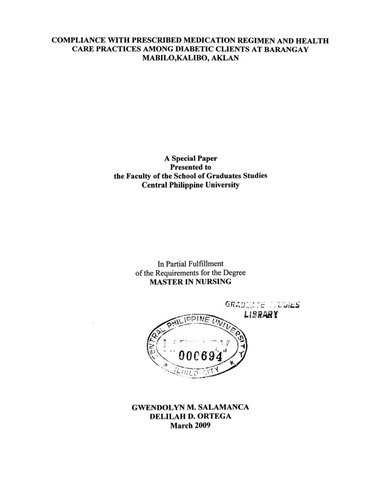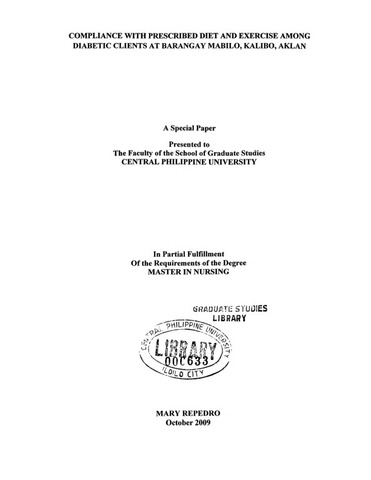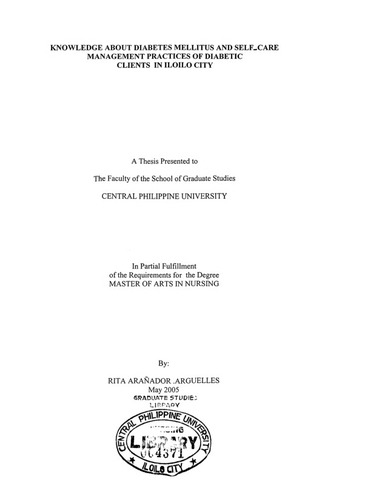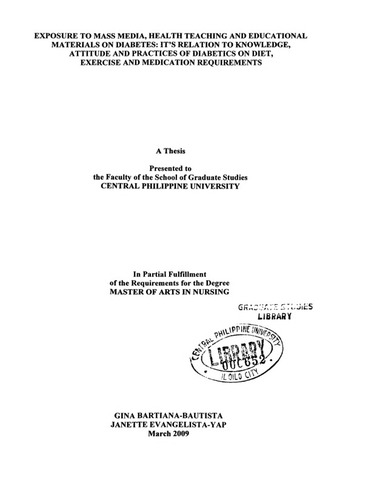Compliance with prescribed medication regimen and health care practices among diabetic clients at Barangay Mabilo, Kalibo, Aklan

Page views
472Petsa
2009Tagapayo ng Tesis
Tagapangulo ng Panel ng Depensa
Magbahagi
Metadata
Ipakita ang buong tala ng item
Abstract
The study was conducted to determine selected factors associated with compliance with prescribed medication regimen among diabetic clients at Barangay Mabilo, Kalibo, Aklan.
The respondents of this study included known diabetics with prescribed medications. The clients were interviewed between December 17 to December 20, 2008, using a structured questionnaire prepared and validated prior to the data gathering.
The result of the study showed that the majority of the respondents were married women, 60 years old and above, had attained elementary education, and with a family income of Php 11, 500 and below.
The majority had a high level of knowledge about diabetes, its medication regimen specifically the name and dose of their medication.
Most of the respondents had favorable attitudes towards taking medication regularly, however, a number of them believed it was not necessary to take it when they feel well.
Most of the respondents had complied completely with the prescribed medication in terms of correct drug and dosage at the right time. Those who were not compliant attributed to forgetfulness than omission.
The findings of the study further showed that females, those who were 60 years old and above, single/widow, with elementary level education and with family income of Php 15, 001 and above, were more knowledgeable about diabetes mellitus and its regimen than their counterparts. With regard to the attitudes of the respondents, the results revealed that more females, those with age 59 and below, married, elementary level education with a high family income, had more positive attitudes toward diabetes mellitus and its regimen. Social support received by the clients from the family, friends, health care provider, and communities, was more common among the males than female 60 years old and above than those younger, single / widow than those married, elementary level education than those with higher education and those family income of Php 15, 000 and below than those with more income, needed attention. Furthermore there were more males, 60 years old and above, single / widow, elementary level education with high income, than their counterparts who were more compliant in following the doctors order.
No significant relationship was found between a) knowledge about diabetes mellitus, b) attitude towards diabetes mellitus, c) social support received from all sources and their d) compliance with prescribed medication. This suggests that knowledge, attitudes and social support received by diabetic clients did not have a significant bearing with his/her compliance towards the prescribed treatment. Therefore, knowledge about diabetes, attitude towards their disease and social support received by the client does not influence with their compliance towards the prescribed treatment. The majority of the respondents had low knowledge about the causes of diabetes. Regarding the social support, all of the respondents had received much attention from The result of the study also showed that the majority of them had fair health care practices in performing mouth care, skin care, foot care and wound care. In terms of health care practices among diabetic clients, the study revealed that the respondents more knowledgeable and having favorable attitudes toward diabetes mellitus were females, 59 years old and below, married, high school and college graduates with high family income. All respondents by age, sex, civil status, income and educational attainment needed much attention from their family, friends, health care provider and communities. The female diabetic clients, 60 years old and above, married, high school and college graduate, with income of Php 15,001 and above, were careful in performing mouth care, skin care, foot care and wound care. This study failed to support the hypothesis that there was a significant relationship between a) knowledge about diabetes mellitus, b) attitude towards diabetes mellitus, c) social support received from all sources, and their health care practices. In other words, knowledge, attitudes and social support did not have a significant bearing with their health care practices In conclusion, knowledge, attitudes and social support did not have a significant bearing with their health care practices.
Paglalarawan
Abstract only
Mungkahing Sipi
Salamanca, G. M. & Ortega, D. D. (2009). Compliance with prescribed medication regimen and health care practices among diabetic clients at Barangay Mabilo, Kalibo, Aklan (Unpublished Master's special paper). Central Philippine University, Jaro, Iloilo City.
Uri
Special paperMga Paksa
Mga keyword
Kagawaran
School of Graduate StudiesDegree
Master of Arts in NursingLokasyon ng Istante
GSL Theses 610.73072 Sa31
Pisikal na paglalarawan
ix, 101 leaves
Collections
- Master in Nursing [37]
Mga parehong item
Ipinapakita ang mga item na nauugnay sa pamagat, may-akda, tagalikha at paksa.
-
Compliance with prescribed diet and exercise among diabetic clients at Barangay Mabilo, Kalibo, Aklan
Repedro, Mary (2009)This research study was conducted to identify the factors associated with compliance to prescribed diet and exercise among diagnosed diabetic clients at Barangay Mabilo, Kalibo, Aklan. Specifically, this study aimed to ... -
Knowledge about diabetes mellitus and self-care management practices of diabetic clients in Iloilo City
Arguelles, Rita A. (2005)This study was conducted to determine the diabetic clients’ knowledge about diabetes mellitus and their self-care management practices. It also intended to find out whether knowledge and self-care practices vary according ... -
Exposure to mass media, health teaching and educational materials on diabetes: It’s relation to knowledge, attitude and practices of diabetics on diet, exercise and medication requirement
Bautista, Gina B.; Yap, Janette E. (2009)This investigation was undertaken to determine the level of exposure of the diabetics to mass media, health teaching and educational materials on diabetes; their knowledge level on prevention and control of diabetes, their ...






